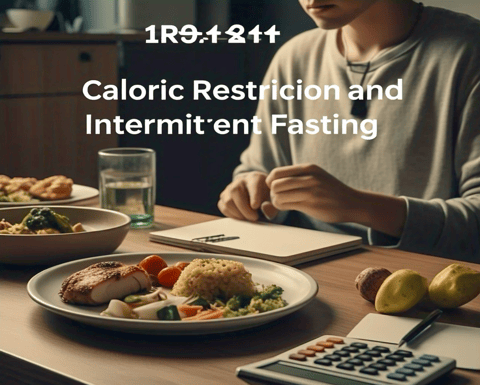Longevity Diets: Eat for a Longer, Healthier Life with Science-Backed Tips
Discover science-backed longevity diets to boost health, prevent disease, and extend life with plant-based foods, healthy fats, and mindful eating habits.
HEALTH TIPS
2/22/20259 min read
Longevity Diets: A Whole-Life Guide to Eating for a Longer, Healthier Life
Introduction
In the pursuit of a longer and healthier life, diet is of central importance. The idea of a "longevity diet" has become an increasingly popular subject in recent times, with researchers and health nuts alike looking for answers on how what we eat can affect our lifespan and health. This article examines the science of longevity diets, including the main principles, trendy dietary regimens, and useful advice for applying these types of eating into your lifestyle.
Plant-Based Eating
Plant-based diets, which focus on foods derived from plants rather than animals, have been linked to numerous health benefits, including a reduced risk of heart disease, diabetes, and certain cancers. These diets are typically high in fiber, antioxidants, and phytochemicals, which can protect against oxidative stress and inflammation.
While some longevity diets are entirely plant-based, others include moderate amounts of animal products, particularly those that are lean and sustainably sourced. The key is to prioritize plant foods while minimizing the consumption of processed and red meats, which have been associated with increased mortality.


Nutrient Density and Whole Foods
A longevity diet emphasizes nutrient-dense foods that provide essential vitamins, minerals, and antioxidants without excessive calories. Whole foods, such as fruits, vegetables, whole grains, nuts, seeds, and legumes, are rich in these nutrients and have been associated with a reduced risk of chronic diseases.
Processed foods, on the other hand, are often high in added sugars, unhealthy fats, and sodium, which can contribute to inflammation and metabolic dysfunction. By prioritizing whole, minimally processed foods, a longevity diet supports overall health and well-being.
Protein Quality and Quantity
Protein is essential for maintaining muscle mass, immune function, and overall health, especially as we age. However, the source and amount of protein can influence longevity. High intake of animal protein, particularly from red and processed meats, has been linked to increased mortality, while plant-based protein sources, such as legumes and nuts, are associated with a lower risk of chronic diseases.
Some longevity diets, like the Mediterranean diet, contain moderate levels of animal protein, especially fish and poultry, while others, like the Okinawan diet, are very plant-based. The most important thing is to consume high-quality protein sources and to not consume too much protein, which puts pressure on the kidneys and can accelerate aging.
Popular Longevity Diets
Healthy Fats
Fats are an essential part of any diet, but the type of fat matters when it comes to longevity. Unsaturated fats, found in foods like olive oil, avocados, nuts, and fatty fish, have been shown to support heart health and reduce inflammation. In contrast, trans fats and excessive saturated fats, often found in processed and fried foods, can contribute to chronic diseases.
A longevity diet includes a balance of healthy fats, with an emphasis on omega-3 fatty acids, which are particularly beneficial for brain health and reducing inflammation.
The Biology of Longevity and Nutrition
Understanding Longevity
Longevity is the duration of a person's life, specifically a long life full of vitality and good health. Genetics contribute to the length of a lifespan, but environmental variables, such as diet, are at least as powerful a force. An aim of a longevity diet is not only to lengthen how many years one survives, but to ensure that those years be healthy ones, free of chronic disease and disability.
The Role of Diet in Longevity
Diet is one of the most reversible factors that influence longevity. What we eat can have an impact on numerous biological processes such as inflammation, oxidative stress, and metabolic function, all of which are interconnected with aging and age-related illnesses. By taking up a diet that promotes these processes, we may be able to delay the process of aging and prevent the onset of chronic diseases like heart disease, diabetes, and cancer.
Caloric Restriction and Intermittent Fasting
Caloric restriction (CR) is perhaps the best-examined diet intervention for longevity, in which calorie consumption is lowered without leading to malnutrition. Studies have demonstrated that CR can increase lifespan in different species, ranging from yeast to mammals, through enhancement of cellular maintenance and minimization of oxidative damage.
Intermittent fasting (IF), an alternating dietary pattern involving periods of eating and fasting, has also been associated with longevity. IF can replicate the effects of CR by stimulating autophagy, a cellular process in which damaged components are broken down by cells and used for energy. Cellular "garbage collection" is essential for cellular health and disease prevention related to aging.


Longevity Diet Principles
Hydration and Beverages
Proper hydration is crucial for maintaining cellular function and overall health. Water is the best choice for staying hydrated, but other beverages, such as herbal teas and green tea, can also contribute to longevity due to their antioxidant content.
On the other hand, sugary drinks and excessive alcohol consumption have been linked to increased mortality and chronic diseases. A longevity diet limits these beverages and emphasizes water and other healthy options.
The Mediterranean Diet
The Mediterranean diet is perhaps the most well-known longevity diet, inspired by the traditional eating patterns of countries bordering the Mediterranean Sea. This diet is characterized by:
- High consumption of fruits, vegetables, whole grains, legumes, nuts, and seeds.
- Olive oil as the primary source of fat.
- Moderate intake of fish and poultry.
- Low consumption of red meat, processed foods, and sweets.
- Occasional consumption of red wine in moderation.
Numerous studies have shown that the Mediterranean diet is associated with a reduced risk of heart disease, stroke, and certain cancers, as well as improved cognitive function and longevity.
The Okinawan Diet
The Okinawan diet is based on the traditional eating habits of the people of Okinawa, Japan, who are known for their exceptional longevity. This diet is predominantly plant-based and includes:
- High consumption of sweet potatoes, vegetables, and legumes.
- Moderate intake of fish and soy products.
- Low intake of meat, dairy, and processed foods.
- Caloric restriction, with a focus on consuming until 80% satiated (a practice called "Hara Hachi Bu").
The Okinawan diet is high in antioxidants, fiber, and phytonutrients, which are responsible for its disease-fighting benefits. The diet has been found to be linked with reduced incidence of age-related diseases and longer lifespan.


The Blue Zones Diet
The Blue Zones refer to geographic areas on earth where individuals live a lot longer than the norm, sometimes up to 100 years and beyond. Scientists have determined that there are similar eating habits among the population in these areas, including:
- Large amounts of plant foods, including fruits, vegetables, whole grains, and legumes.
- Moderate amounts of fish and lean meats.
- Minimal intake of processed foods, added sugars, and refined grains.
- Frequent intake of nuts, seeds, and healthy fats.
- Moderate drinking of red wine on occasion.
The Blue Zones diet focuses on whole, minimally processed foods and a balanced eating philosophy, with a focus on community and deliberate eating habits.
The Plant-Based Diet
The plant-based diet relies on plant food sources such as fruits, vegetables, whole grains, legumes, nuts, and seeds while avoiding or restricting animal products. The diet contains high amounts of fiber, antioxidants, and phytonutrients, which help to defend the body against diseases and maintain its health.
Evidence has indicated that diets based on plants are linked with reduced risk for heart disease, diabetes, and some cancers, as well as better weight control and longer lifespan. While some plant-based diets, including the vegan diet, do not use any foods that come from animals, others, including the vegetarian diet, allow dairy products and eggs.
The Pescatarian Diet
The pescatarian diet is a plant-based diet with fish and seafood as the main source of animal protein. The diet is high in omega-3 fatty acids,
which are healthy for heart and brain health, and has a lower risk of chronic diseases.
The pescatarian diet focuses on:
- High fruit, vegetable, whole grain, legume, nut, and seed intake.
- Moderate fish and seafood consumption.
- Limited intake of meat, poultry, and processed foods.
This diet provides the nutritional benefits of a plant-based diet with the added nutritional health of fish and seafood.


Practical Tips for Adopting a Longevity Diet
Start with Small Changes
Transitioning to a longevity diet doesn't have to be overwhelming. Start by making small, sustainable changes to your eating habits. For example, you can begin by incorporating more fruits and vegetables into your meals, swapping refined grains for whole grains, or choosing healthier fats like olive oil instead of butter.
Prioritize Whole, Minimally Processed Foods
Focus on eating whole, minimally processed foods that are rich in nutrients and free from added sugars, unhealthy fats, and artificial additives. This includes fruits, vegetables, whole grains, legumes, nuts, seeds, and lean proteins.
Experiment with Plant-Based Meals
Attempt to include more plant-based meals in your diet, even if you're not prepared to become entirely vegetarian or vegan. Begin with one to two meatless meals every week and build up to eating them more often. Experiment with various plant-based protein sources, including beans, lentils, tofu, and tempeh.
Practice Mindful Eating
Mindful eating involves paying attention to your hunger and fullness cues, eating slowly, and savoring each bite. This practice can help you develop a healthier relationship with food and prevent overeating. Additionally, eating in a relaxed environment and enjoying meals with others can enhance the overall eating experience.
Stay Hydrated
Proper hydration is essential for overall health and longevity. Aim to drink plenty of water throughout the day and limit sugary drinks and excessive alcohol consumption. Herbal teas and green tea can also contribute to hydration and provide additional health benefits.
Limit Processed and Red Meats
Reduce your intake of processed and red meats, which have been linked to increased mortality and chronic diseases. Instead, opt for lean protein sources such as fish, poultry, legumes, and plant-based proteins.
Include Healthy Fats
Incorporate healthy fats into your diet, such as those found in olive oil, avocados, nuts, seeds, and fatty fish. These fats support heart health, reduce inflammation, and provide essential nutrients.
Practice Caloric Restriction or Intermittent Fasting
Consider incorporating caloric restriction or intermittent fasting into your eating pattern, if appropriate for your health and lifestyle. These practices can promote cellular repair, reduce oxidative stress, and support longevity. However, it's important to consult with a healthcare professional before making significant changes to your diet.


Focus on Nutrient Density
Choose foods that are nutrient-dense, meaning they provide a high amount of nutrients relative to their calorie content. This includes fruits, vegetables, whole grains, legumes, nuts, seeds, and lean proteins. Nutrient-dense foods support overall health and help prevent nutrient deficiencies.
Enjoy Meals with Others
Eating with others can enhance the social and emotional aspects of eating, which are important for overall well-being. Sharing meals with family and friends can also encourage healthier eating habits and provide a sense of community and connection.
The Role of Supplements in a Longevity Diet
While a well-balanced longevity diet should provide most of the essential nutrients, some individuals may benefit from supplements to address specific nutritional needs or deficiencies. Common supplements associated with longevity include:
- Omega-3 Fatty Acids: In fatty fish, flaxseeds, and walnuts, omega-3s promote heart and brain health. If you don't eat enough of these foods, a fish oil or algae supplement might be helpful.
- Vitamin D: Needed for bone health and immune function, vitamin D is available from sunlight, fortified foods, and supplements. Many individuals, particularly those who live in northern latitudes, will require a vitamin D supplement.
- Antioxidants: Vitamins C and E, as well as selenium and beta-carotene, are antioxidants that protect against oxidative stress. While these nutrients are best obtained from whole foods, supplements may be helpful for individuals with specific health conditions.
- Probiotics: These beneficial bacteria support gut health and may improve digestion and immune function. Probiotic supplements can be useful for maintaining a healthy gut microbiome, especially after antibiotic use.
- Coenzyme Q10 (CoQ10): This antioxidant is involved in energy production and may support heart health. CoQ10 levels decline with age, and supplements may be beneficial for older adults.
It's important to consult with a healthcare professional before starting any supplements, as they can interact with medications and may not be necessary for everyone.


The Importance of Physical Activity and Lifestyle Factors
While diet is a crucial component of longevity, it's important to recognize that other lifestyle factors also play a significant role. Regular physical activity, stress management, adequate sleep, and social connections are all essential for promoting a long and healthy life.
Physical Activity
Regular exercise is one of the most effective ways to support longevity. Physical activity helps maintain muscle mass, bone density, and cardiovascular health, while also reducing the risk of chronic diseases. Aim for a combination of aerobic exercise, strength training, and flexibility exercises to support overall health.
Stress Management
Chronic stress can have detrimental effects on health, contributing to inflammation, hormonal imbalances, and an increased risk of chronic diseases. Practices such as mindfulness meditation, yoga, deep breathing, and spending time in nature can help manage stress and promote emotional well-being.
Sleep
Sufficient sleep is needed for cellular restoration, brain function, and general wellness. Inadequate sleep is associated with higher risks of obesity, diabetes, cardiovascular disease, and cognitive impairment. Strive for 7-9 hours of quality sleep each night in support of longevity.
Social Connections
Strong social connections and a sense of community are important for emotional well-being and longevity. Studies have shown that individuals with strong social ties tend to live longer and have a lower risk of chronic diseases. Make time for meaningful relationships and engage in activities that foster a sense of belonging.
Eating Whats
Revitalize your body this winter! Boost energy, support joints, and burn fat naturally with proven remedies for a healthier, more active you!
Wellness
team.eatingwhats@gmail.com
© 2025. All rights reserved.
